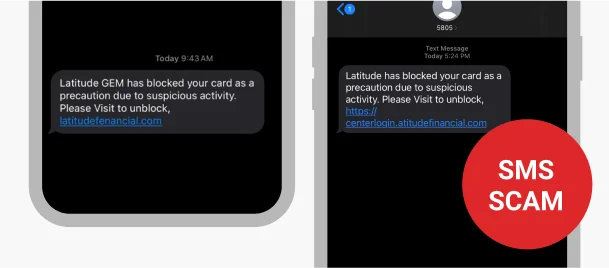Jul - Sep 2024
Fraud & Scams Prevention Tips for Paris 2024 Olympics

As the excitement of the Paris Games draws near, it’s crucial to stay vigilant against potential fraud and scams. Here are some essential tips to protect yourself and your financial information:
Purchase Tickets from Official Sources
- Only purchase tickets from the official Paris 2024 website or authorised resellers.
- Avoid purchasing tickets from third-party websites or sellers to prevent counterfeit or overpriced tickets.
- Book accommodations through reputable websites and read reviews from other travelers.
- Be wary of deals that seem too good to be true.
- Use a credit card for bookings to benefit from additional protection against fraud.
Use Official Transportation Services
- Use licensed taxis or official ride-sharing services.
- Avoid accepting rides from unregistered drivers or individuals offering transportation services unofficially.
- Be cautious of unsolicited emails claiming to offer tickets or accommodation.
- Look for signs of phishing such as misspelled URLs, urgent demands for personal information, or suspicious attachments.
- Always verify the sender’s email address and contact the organisation directly through their official website if unsure.
- Use strong, unique passwords for your accounts and enable two-factor authentication where possible.
- Avoid using public Wi-Fi for financial transactions.
- Frequently check your credit card statements for unauthorised transactions.
- Report any suspicious transactions to Latitude immediately.
- Avoid sharing your card details over the phone or online unless you are certain of the recipient’s identity and legitimacy.
- Use contactless payments where possible to minimise physical contact and reduce the risk of card skimming.
- By following these simple tips, you can help protect yourself from fraud and scams, ensuring a safer and more enjoyable experience at the Paris 2024 Olympics. Stay alert, stay informed, and safeguard your financial information.
Romance scam

Watch out - Be aware of scammers exploiting dating or friendship to gain your trust and steal your money. Never assume someone you’ve only met online is who they claim to be. Scammers will go to great lengths to make the relationship seem real, manipulating you into giving them money.
These scammers use social media, dating and gaming apps, or websites to find you. They may also reach out via SMS or email. Hiding behind fake profiles and identities (even posing as celebrities), they’re experts at making you feel the relationship is genuine.
Once they have your trust, they will fabricate an 'emergency' and ask for money or products to help them. They may also request you to set up accounts or transfer money for them. Scammers are patient and can spend years building this trust.
Remember - Scammers will quickly express strong feelings, so the relationship progresses quickly because you feel special right away. If you're chatting on your usual social media platform or an official dating service, they’ll try to move the conversation to another platform, like WhatsApp.
Romance scammers encourage secrecy and push you to trust only them, often attempting to isolate you from family and friends. There will always be an excuse for why they can’t meet in person or appear on camera, such as living overseas, being in a remote location, or having malfunctioning technology.
Other warning signs include:
- Their online profile doesn’t align with what they tell you about themselves.
- They discuss money or investments, possibly claiming to know about cryptocurrency and offering to teach you.
- They ask for personal photos, videos, or information that could be used against you in the future.
- The scammer becomes desperate or angry if you don’t comply with their requests, and they may threaten to end the relationship.
- Never send or transfer money to someone you haven’t met in person.
- Verify the person's identity to ensure they are who they claim to be.
- Be cautious about what personal information you share.
Latitude Impersonation Phone Scam
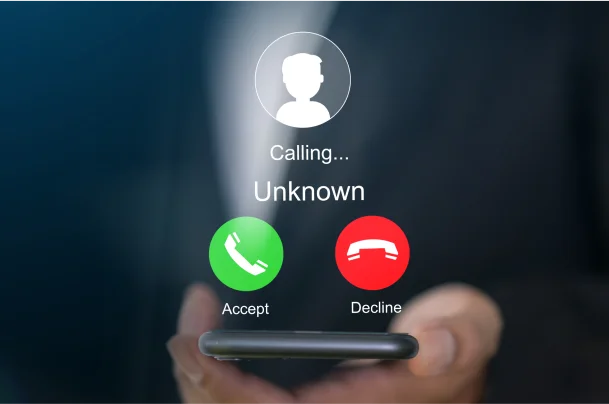
Watch out - we've received various reports of calls claiming to be from Latitude asking customers to authorise a transaction or a refund on their account. Calls often appear to be a recorded message, but it can also be a cold call, posing as the Latitude Fraud Dept. This scam has also been delivered via SMS with a number to call to ‘confirm’ the transaction.
If you respond to the recorded message or contact the number provided in the SMS, you may speak with a scammer who will attempt to trick you into following instructions (e.g. Refunding an unauthorised purchase) to steal your money or personal details.
Remember – Latitude will never ask you to share sensitive banking details (password, PINs, or one-time passcode for payment) in an email or SMS. We’ll never ask you to log into your account by clicking a link or request remote access to your computer or device, or transfer money to another account.
Protecting yourself
- Hang up on suspicious callers claiming to be from Latitude.
- Call Latitude using the number listed on our official website or on the back of your card to confirm whether a call or message is real. Don’t call the number provided in the message.
- If you receive a call from Latitude asking you to authorise anything, don’t do it!
End of Financial Year scam
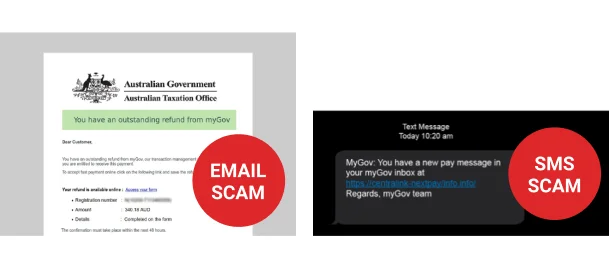
Watch out - cybercriminals exploit the busy tax period by increasing their scam activity. During ‘Tax time’, scammers may use advanced tactics to catch you off guard. Their goal is clear - to steal your money or personal information.
They often engage in tax-related impersonation scams, particularly those appearing to originate from the Australian Tax Office (ATO) or other government services such as myGov.
Scammers may impersonate the ATO or myGov, threatening individuals and businesses with tax debt or offering rebates.
Remember - stay alert to phishing, smishing (SMS phishing), and vishing (phone call phishing) scams. Always verify the authenticity of requests before clicking on links, opening attachments, or following instructions, especially when dealing with finances or personal information.
If you’re unsure about the authenticity of a call or message, contact the ATO or relevant government service to verify.
Protecting yourself
- If you receive a request via email, phone, or SMS to change or update payment information, always contact the supplier directly to verify using contact information you know is genuine, not the contact details provided in the suspicious communication.
- Turn on multi-factor authentication for all essential services such as email, bank, social media accounts, and any databases holding personal or customer information.
- Access websites directly by typing the URL into a web browser rather than clicking on a link.
- Remember, if something seems too good to be true, it usually is. Pause and verify before acting.
- If you receive one of these messages, do NOT click on the link. Delete the message immediately.
Latitude impersonation scam alert
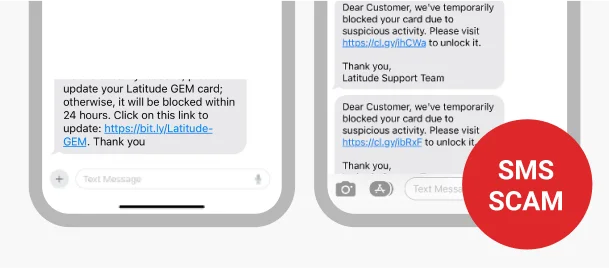
Watch out - we’re seeing a rise in scams impersonating banks and financial services. Be aware of SMS and phone calls claiming to be from Latitude. These requests often ask you to provide identity details, credit card details, sensitive online service centre login details, or download software.
Remember - we'll never ask you to share sensitive login details like your access PIN, card details, one-time passcodes or request access to your device.
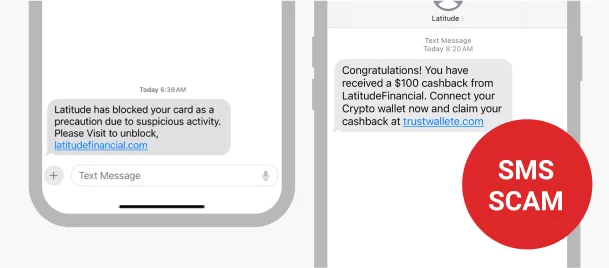
Protecting yourself
- Be vigilant. As well as financial institutions, impersonation scams can also involve government agencies, organisations or even friends or family members.
- Be cautious of unexpected emails, SMSs and phone calls. Never click links or open any attachments.
- Contact Latitude immediately using a listed number if you’ve entered personal details into a suspicious link or you receive a message stating your account is at risk, under review or locked.
- Never share personal and financial details, passwords, account numbers, or one-time passcodes with anyone.
- Always pause and reassess the situation. Scammers often create a sense of urgency, pressuring you to act quickly.
